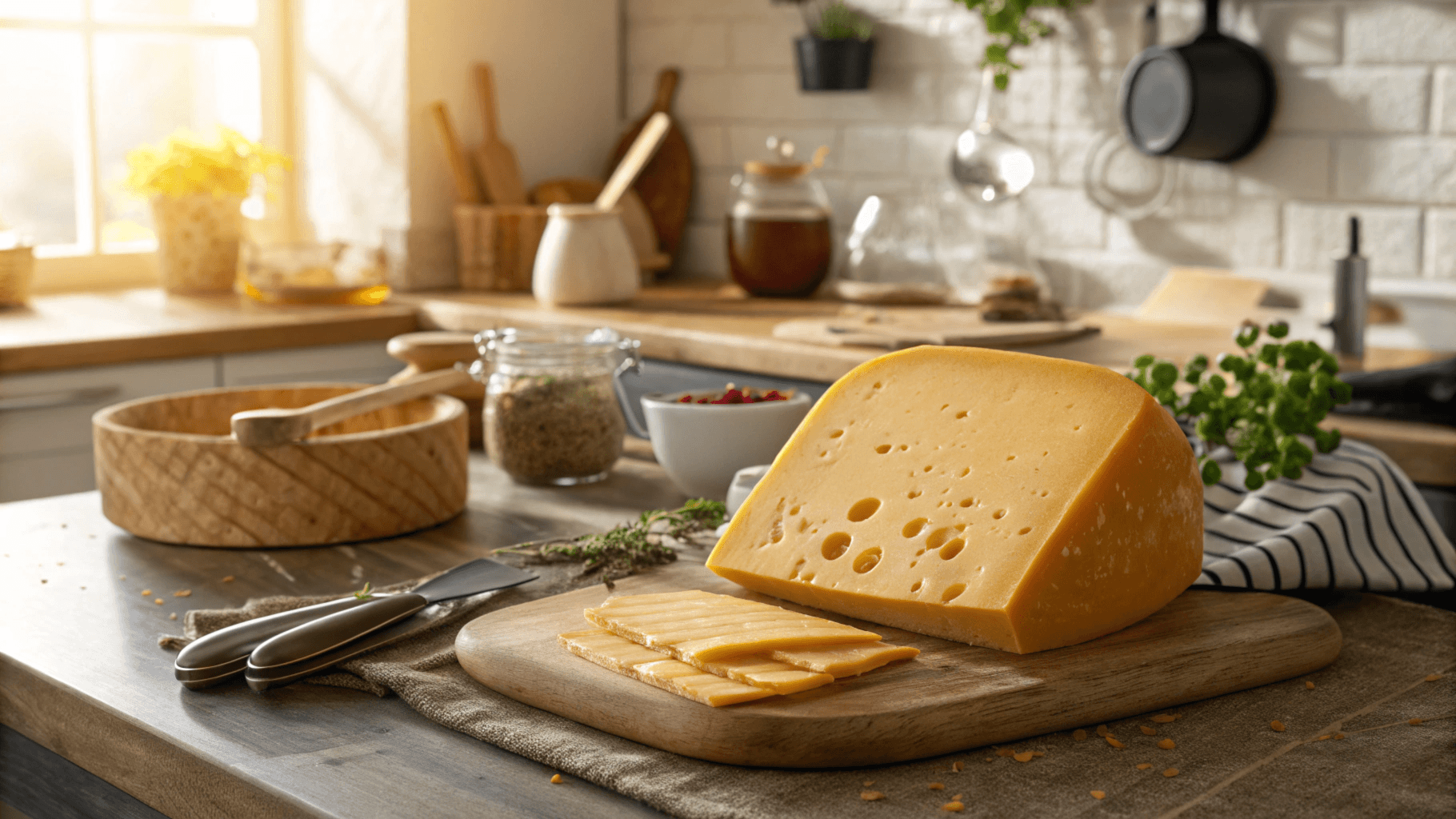Cheese lovers often debate which cheese is the healthiest, and Gouda frequently tops the list. Known for its creamy texture and rich flavor, Gouda also boasts impressive nutritional benefits. In this article, we’ll explore is Gouda the healthiest cheese, what makes it stand out, and how to incorporate it into a balanced diet. From its nutritional profile to its health benefits, let’s uncover why Gouda deserves a spot in your kitchen.
What Defines a Healthy Cheese?
Cheese is often praised for its flavor and versatility, but not all cheeses are created equal when it comes to nutrition. To answer is Gouda the healthiest cheese, we first need to understand what makes a cheese healthy.
For related tips on maintaining a nutrient-rich diet, consider pairing Gouda with a hearty chicken bone broth recipe for an immune-boosting meal.
Nutritional Basics of Cheese
Cheese is a powerhouse of essential nutrients, including calcium, protein, and healthy fats. These elements support strong bones, muscle repair, and energy production. However, the healthiness of cheese also depends on its vitamin and mineral content, such as Vitamin K2, which plays a crucial role in bone and heart health.
Beyond nutrients, how cheese is processed matters. Some cheeses retain more natural goodness, while others lose key benefits during production.
Key Factors That Make a Cheese Healthy
Several factors influence whether a cheese is healthy:
- Milk Source: Cheeses made from grass-fed milk often have higher levels of Omega-3s and fat-soluble vitamins.
- Processing: Minimal processing preserves more nutrients, making natural cheeses healthier than processed ones.
- Additives: Look for cheeses free from unnecessary preservatives or artificial colors.
Gouda checks many of these boxes, thanks to its rich nutrient profile and traditional production methods. But how does it compare to other cheeses?
Understanding Gouda’s Nutritional Profile
To determine is Gouda the healthiest cheese, we need to examine what’s inside this creamy delight. Gouda offers a unique blend of nutrients that set it apart from many other cheeses.
Calcium and Protein Content
Gouda is packed with calcium and protein, making it a fantastic choice for maintaining strong bones and supporting muscle repair. Just one ounce of Gouda delivers about 200 milligrams of calcium, which is roughly 20% of the daily recommended intake. Its protein content, averaging 7 grams per ounce, is another reason it’s considered a nutritional powerhouse.
The high calcium levels in Gouda can help prevent osteoporosis, while its protein boosts energy and keeps you feeling full. These qualities make Gouda not only delicious but also practical for a balanced diet.
For a nutrient comparison, Gouda pairs well with nutrient-dense ingredients like those highlighted in is eating beef heart healthy?, offering complementary health benefits.
Vitamin K2: Gouda’s Superpower
One of Gouda’s standout features is its high concentration of Vitamin K2, a rare nutrient that supports bone density and heart health. In fact, Gouda contains up to 75 micrograms of Vitamin K2 per 3.5-ounce serving, which is significantly higher than many other cheeses.
Vitamin K2 works synergistically with calcium and Vitamin D to improve bone health and reduce the risk of fractures. It also helps prevent arterial calcification, a major contributor to heart disease. This nutritional edge gives Gouda a strong case for being one of the healthiest cheeses.
Comparing Gouda with Other Popular Cheeses
When considering is Gouda the healthiest cheese, it’s helpful to compare it with other well-loved options. Cheddar, Parmesan, and Brie are popular contenders, but how do they measure up?
Gouda vs. Cheddar
Cheddar cheese is a common favorite, but Gouda holds a nutritional advantage in several ways. While both are rich in calcium and protein, Gouda boasts higher levels of Vitamin K2. Cheddar, on the other hand, contains more sodium, which may be a concern for those watching their salt intake.
Additionally, Gouda’s creamy, slightly sweet flavor makes it more versatile in recipes compared to Cheddar’s sharper profile.
Gouda vs. Parmesan and Brie
Parmesan and Brie offer unique benefits, but Gouda often comes out on top. Parmesan is higher in protein and lower in fat, making it a leaner choice. However, it lacks Gouda’s Vitamin K2 content, which is essential for long-term bone and heart health.
Brie, known for its creamy texture, is lower in calcium and contains fewer fat-soluble vitamins than Gouda. While Brie is a decadent option for occasional indulgence, Gouda provides a better balance of nutrients for everyday consumption.
The Health Benefits of Gouda Cheese
Gouda isn’t just delicious—it’s packed with nutrients that can positively impact your health. To answer is Gouda the healthiest cheese, let’s explore the specific ways it supports your well-being.
Supporting Bone Health
Gouda is a bone-friendly cheese, thanks to its rich calcium and Vitamin K2 content. Calcium strengthens bone density, while Vitamin K2 helps direct calcium to your bones, preventing it from settling in the arteries. This combination makes Gouda an excellent dietary addition for reducing the risk of osteoporosis and fractures.
For those looking for more calcium-rich recipes, you can explore this Gouda Cheese Recipe Guide for creative and delicious ideas.
Boosting Heart Health
Did you know that Gouda can benefit your heart as well? Vitamin K2 plays a vital role in preventing arterial calcification, which reduces the risk of heart disease. Regular consumption of moderate portions of Gouda could contribute to better cardiovascular health.
Additionally, Gouda contains healthy fats that support the absorption of fat-soluble vitamins, ensuring your body gets the most out of your meals.
Part 5: Using Gouda Cheese in a Healthy Diet
Incorporating Gouda into a balanced diet is easy, and its versatility makes it a go-to choice for many recipes. Here’s how you can make the most of it.
Portion Control and Balanced Meals
Like all cheeses, Gouda is calorie-dense, so portion control is key. Stick to a serving size of one to two ounces, which is enough to enjoy its flavor and reap its nutritional benefits. Pair it with whole grains, fresh vegetables, or lean proteins for a balanced meal that satisfies your taste buds and your body.
For example, a slice of Gouda melted over roasted vegetables or added to a whole-grain sandwich offers both flavor and health benefits.
Gouda in Low-Carb and Keto Recipes
Gouda is a fantastic option for those following low-carb or keto diets. Its high-fat, low-carb profile makes it ideal for creating indulgent yet diet-friendly dishes. Try it in Gouda-stuffed mushrooms, cheesy spinach wraps, or as a topping for baked chicken.
For more healthy and creative recipe ideas, check out this cooking guide.
Cooking with Gouda: Tips and Recipes
Gouda cheese isn’t just a nutritional powerhouse—it’s also a delight to cook with. From quick snacks to gourmet dishes, this versatile cheese enhances every recipe. So, is Gouda the healthiest cheese for your cooking adventures? It just might be!
Best Cooking Methods for Gouda
Gouda shines in a variety of cooking methods, but it’s particularly suited for melting. Its creamy texture makes it a perfect choice for:
- Grilled Sandwiches: Layer Gouda between slices of hearty bread for a gooey, satisfying meal.
- Baked Dishes: Use shredded Gouda in casseroles or gratins to add richness and depth.
- Fondue: Combine Gouda with other cheeses for a silky, indulgent dip.
For non-melting applications, aged Gouda is ideal for shaving over salads or pairing with fresh fruits. Its nutty, caramel-like flavor brings complexity to simple dishes.
Healthy Recipes Featuring Gouda
Looking for healthy ways to enjoy Gouda? Here are a few ideas to inspire your meals:
- Gouda-Stuffed Mushrooms: Hollow out button mushrooms and fill them with shredded Gouda, garlic, and herbs before baking.
- Spinach and Gouda Wraps: Add a slice of Gouda to a whole-grain tortilla with sautéed spinach and grilled chicken for a quick, balanced lunch.
- Cauliflower Gouda Mash: Mix mashed cauliflower with melted Gouda for a low-carb, creamy side dish.
These recipes highlight how Gouda can be both indulgent and nutritious, proving that you can enjoy it without compromising your health goals.
Are There Any Downsides to Eating Gouda?
While Gouda has many benefits, no cheese is perfect. To fully answer is Gouda the healthiest cheese, we must consider potential drawbacks.
Calorie and Sodium Concerns
Like most cheeses, Gouda is calorie-dense. A single ounce contains around 100 calories, so it’s essential to practice portion control. Additionally, Gouda has a moderate sodium content, which can be a concern for those with high blood pressure or heart issues. Pairing Gouda with fresh, low-sodium foods like vegetables can help balance your meal.
Lactose Intolerance and Gouda
If you’re lactose-intolerant, you may still be able to enjoy Gouda in moderation. Aged Gouda has lower lactose levels than younger varieties, making it easier to digest for many people. However, it’s always best to test your tolerance with small portions and consult a healthcare professional if needed.
FAQs About Gouda Cheese and Health
Curious questions about Gouda cheese often arise, especially when debating is Gouda the healthiest cheese. Let’s address some of the most common inquiries to clear up any confusion.
Is Gouda Cheese Better Than Other Cheeses for Health?
Gouda’s high levels of calcium, protein, and Vitamin K2 make it one of the top contenders for a healthy cheese choice. Compared to many other cheeses, Gouda provides unique benefits for bone and heart health due to its K2 content. However, like any cheese, moderation is key to enjoying its health perks without overindulging in calories or sodium.
Can Gouda Cheese Help with Weight Management?
Yes, Gouda can fit into a weight management plan, especially when consumed in controlled portions. Its high protein content helps keep you feeling full, which may reduce the temptation to snack on less healthy options. Pairing Gouda with fresh vegetables or whole-grain crackers can create a balanced, satisfying snack that supports your goals.
Conclusion: Is Gouda the Healthiest Cheese?
Gouda’s Nutritional Edge
After exploring its impressive nutrient profile, health benefits, and versatility, it’s clear why Gouda is often considered a top-tier cheese. Its abundance of calcium and Vitamin K2 sets it apart, offering significant support for bone strength and heart health. Whether you’re incorporating it into recipes or enjoying it as a snack, Gouda proves to be both delicious and nutritious.
Final Thoughts on Gouda’s Place in Your Diet
So, is Gouda the healthiest cheese? While other cheeses have their merits, Gouda’s unique combination of taste and health benefits makes it a standout option. Its versatility in cooking, alongside its nutrient-packed profile, ensures it can be a regular feature in a well-rounded diet. Give it a try—you might just discover your new favorite cheese!

